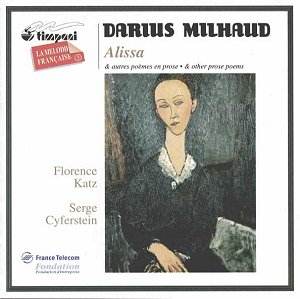|
|
Search MusicWeb Here |
|
 |
||
|
Founder:
Len Mullenger (1942-2025) Editor
in Chief:John Quinn
|
|
|
Search MusicWeb Here |
|
 |
||
|
Founder:
Len Mullenger (1942-2025) Editor
in Chief:John Quinn
|
 |
Darius MILHAUD (1892-1974)
Alissa op 9 Trois Poèmes de Lucile de Chateaubriand op 10 D’un Cahier inédit d’Eugénie de Guérin op 27 Deux Poèmes de Coventry Patmore op 30 Serge Cyferstein, piano Recorded Theatre de Poissy, May 1994 |
| CD available for post-free online mail-order or you may download individual tracks. For some labels you can download the entire CD with a single click and make HUGE savings. The price you see is the price you pay! The full booklet notes are available on-line. | |
|
NOTE • Click on the button and you can buy the disc or read the booklet details • You can also access each track which you may then sample or down load. • Further Information. |
|
|
The centenary of Milhaud’s birth provided a rich crop of recordings. It must also have stimulated interest in his songs, long marginalized, because Carole Farley on ASV CDDCA810 and, the following year, Florence Katz both recorded Alissa. Farley, with John Constable, also recorded L’Amour chante (an astounding – though in Milhaud’s case all too credible – op. 409) and the better-known Poèmes Juifs.
Milhaud’s settings on this disc are all of prose. Even though one would expect to encounter verse – notably I suppose from Chateaubriand and Coventry Patmore – we find instead a highly poeticised but nevertheless unambiguous prose-poetry. The settings date from 1910-15 though Alissa underwent revision in 1931 when Milhaud took the opportunity to modify harmony and also the piano. The amorous prose of Lucile de Chateaubriand reveals some strain at the top compass of Katz’s mezzo. However I liked the settings’ piquant descent to the minor to distil the languor of the prose; as I did Milhaud’s ingenious lightly tripping bass and innocent treble in the third setting, appropriately called Innocence. Though Katz is somewhat limited tonally she is an imaginative singer and successfully bleaches her tone before opening out in passionate declamation.
The Eugénie de Guérin settings are rather more ambiguous and opaque settings, reflecting the decidedly more ambiguous intimacies of a diary. Nous voilà donc exiles gains in speculative intimacy as it evokes the separation, the hyperbolic "exile" of the text. The two Patmore settings again put some strain on Katz’s tessitura but she and Cyferstein do well to evoke the little rippling treble and the plays of light flecking the narrative before the violent and dramatic outburst of Départure fractures the song. This is certainly a tensely engaged setting though one that perhaps constructs a psychodrama out of Patmore’s rather ornate and oratorical curlicues. The Azalea is a disappointingly anodyne setting; it lacks melodic distinction and textual insight. One would have thought Milhaud could have made something out of lines such as les rayons du soleil declinant but he religiously fails to do so. Some attractively soft singing from Katz and discreet pianism from Cyferstein however.
The most significant cycle here is Alissa. The text is taken from Gide’s La porte étroite. A two part work, the first explores a conversation between Alissa and Jérome which, separated by a piano prelude, is followed by Alissa’s diary, a series of intense reflections. Milhaud’s setting is properly austere and increasingly so; he mirrors and explores text in the music with variational skill. The thoughtful chords in Jérome et Alissa mirror the dialogue whilst the rise and fall in the line of the following setting (track 11) impart a romantic impress, active and questing, to the setting. In the setting of Lettre d’Alissa simplicity and unaffectedness prevail – textually and musically. Listen to the romantic piano postlude after the ambiguities of an admission of love; treasurably acute. Milhaud can also go some way to subvert the conventional romantic expectation or response. In a harsh letter from one lover to the other the almost brusque simplicities of the piano writing are Milhaud’s own brand of anti-pathos. He employs a tolling bell motif to allude to textual trouble and a form of walking bass to indicate the determination of Alissa’s resolve. The stark, simple chords of the final setting are the death-wishing culmination of the setting as a whole. As I said austere but for me exceptionally convincing, brilliantly accomplished and rather moving.
Texts and notes are in English and French and are quite sufficient. The performances are generous and sympathetic. Some worthwhile discoveries here.
Jonathan Woolf
|
| ADDITIONAL INFORMATION •
You can sample only 30 seconds (or 15% if that is longer) of a given track. Select from the View tracks list. Each sample will normally start from the beginning but you can drag the slider to any position before pressing play. • PLEASE NOTE: If you are behind a firewall and the sound is prematurely terminated you may need to register Ludwig as a trusted source with your firewall software.
•You will need Quicktime to hear sound samples. Get a free Quicktime download here • If you cannot see the "Sample All Tracks" button you need to download Flash from here.
|
|
|
Return to Index |